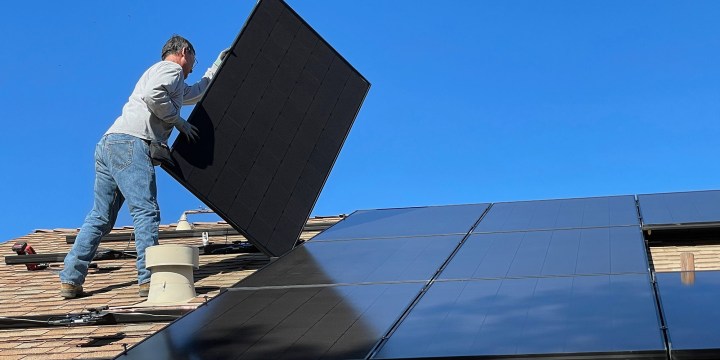POWER CRISIS
How government tax incentives for rooftop solar energy panels could work

Red tape and weak government finances are major obstacles in choosing mechanisms to reward households and businesses
The government wants to encourage more households and businesses to install rooftop solar energy panels and, in the process, offer them tax incentives for reducing their dependence on Eskom and the national grid.
The plan, announced by President Cyril Ramaphosa in his recent State of the Nation Address, will see SA join the ranks of the US, the UK and Germany, which have similar tax regimes.
The shape and mechanism of the tax incentives remain unknown but the full details are likely to be unveiled in the Budget Speech on Wednesday, 22 February.
DM168 canvassed tax and economic experts on how the mooted tax incentive could work. It could be designed in two ways: it could include specific tax benefits targeting households and individual consumers, and others targeting businesses.
Legal limitations on tax benefits
For households and businesses, the government could make solar panel installations tax-deductible (known more formally as capital allowances), paving the way for them to be able to get refunds when tax returns are filed every year. This might be a favoured avenue considering that there is already a tax system in place for deductions.
But it has legislative limitations.
The Income Tax Act, which governs the taxation of income, provides for capital allowances relating to renewable energy and the generation of energy from solar panels. But the act only targets businesses, allowing them deductions if they use solar panel installations for trading or business activity. They can deduct the value of their solar power systems as a depreciation expense from the profits they generate.
So the legislation makes no provisions or incentives for households or individuals that have solar panels for their personal electricity consumption.
Tertius Troost, senior manager for tax consulting at Mazars, says the National Treasury could push for amendments to the act and broaden it to allow tax incentives for such households. But legislative amendments take a long time to be passed and SA cannot afford more delays in energy generation and security.
Visit Daily Maverick’s home page for more news, analysis and investigations
“For example, the deduction would then be allowed against an individual’s remuneration or personal income. One would need to see whether this route is taken, as it could be perceived by the public as putting money back into the pockets of higher net worth taxpayers,” says Troost.
After all, solar panel installations are expensive – typically costing from R60,000 upwards – so only a privileged few might be able to benefit from tax incentives.
An option the government could consider is not imposing value-added tax (VAT) on solar materials, including panels, inverters and batteries for storage, known as zero rating. This mechanism is designed to limit the effect of rising prices on products for poor households as the government does not impose VAT on food items such as mealie meal, rice, brown bread, dried beans, fresh fruit and vegetables, and others. But tweaking a VAT system is considered controversial and a time-consuming exercise as it took a long time for sanitary pads alone to be exempted from VAT.
“The VAT option would be improbable, as it is not always guaranteed that the VAT saving will be pushed through to the consumer, but could only result in producers or installers taking a higher profit margin.
“If a solar panel currently costs R3,000 per panel, including VAT, and panels are suddenly zero-rated, one expects the price to decrease to about R2,600 per panel. What could happen is that producers and installers don’t decrease their prices at all, or only decrease the prices slightly, thereby the benefit does not filter through to the end consumer,” says Troost.
Another tax consideration the government could implement is globally accepted and implemented, mainly in the UK and Australia: offering households subsidies, grants or low-interest loans for solar panel installations. But Troost doubts that this is possible because the government’s finances are weak and there is no fiscal room to hand out more money to the public for solar installations. Government red tape will also stand in the way of implementing this.
Pravir Jeaven, associate director and tax specialist at KPMG, has warned that the government doesn’t have enough fiscal space and resources to provide a tax incentive for solar installations. The government might be forced to reduce other tax-deductible benefits on medical aid and retirement products to be able to afford tax incentives on solar. “The energy crisis is quite key as load-shedding does cost the economy by way of a possible reduction in trade which would naturally result in lower tax being collected,” he says.
Tariffs for households and businesses
Another complication is that there is no nationwide framework for a feed-in tariff payment that households and businesses would receive from the government for generating and providing excess solar energy into the electricity grid. The National Energy Regulator of SA has only recently approved a feed-in tariff for Cape Town, which now has a solar tariff of 78.98c/KWh, and the City will add 25c/KWh to that.
The move to solar is happening at a swift pace because of the worsening impact of blackouts. But because SA doesn’t have a large local solar panel and equipment manufacturing industry, the goods are mostly imported.
Lullu Krugel, chief economist at PwC, estimates that in 2022 SA imported solar panels worth more than R5-billion – up from about R4-billion in the previous year. “We estimate that these panels will provide an additional 2,000MW of generating capacity [equal to Stage 2 blackouts] in 2023,” she says.
KPMG’s Jeaven says another tax incentive that could be implemented by the government is a reduction in the customs duty on solar panel and equipment imports. This would make it cheaper for local suppliers to import solar panels and equipment into the country.
“If one considers the implementation of a tax on a good or service it would typically be to achieve one of two purposes, firstly increasing tax collections or alternatively impacting supply and demand for goods or services by impacting the cost thereof – generally the cheaper the item, the higher the demand for the item is and visa versa.”
A source close to Ramaphosa and his Presidency says the first prize would be a tax incentive system that benefits everyone, including the solar panel manufacturing industry, businesses and households.
“Striking that balance will be difficult. We have had many debates. It is now up to the National Treasury to announce a workable and inclusive solution.” DM168
DM168
This story first appeared in our weekly Daily Maverick 168 newspaper, which is available countrywide for R25.





















 Become an Insider
Become an Insider
Not every step and action taken by the Government needs to be redistributive, though almost every action is which means that the effective tax rate bearing down on most middle class South Africans, is far, far higher than the supposed highest marginal tax rate, given that South Africans are required to pay extra for security, education. health, et al, so, given it is in the overall nNational interest, it would be good business and prudent were tax allowances to be granted for installed solar system at private residences, which are overwhelmingly in the national interest and benefit all by shouldering some of the weight of carrying Eskom.
It might even save many, many jobs – now wouldn’t THAT be a wonderful thing?